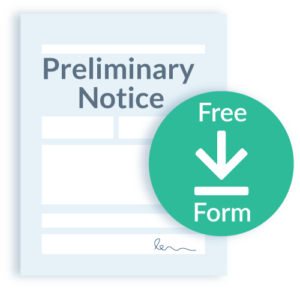Private projects
Preliminary Notice is not required for those contracted directly by the property owner.
Preliminary Notice is not required for those contracted directly by the property owner.
Not required.
Since GCs will not make a claim against their own bond for non-payment, they do not have bond claim rights, and have no preliminary notice requirement.
Subcontractors and suppliers must send notice.
Notice of lien rights served on owner prior to providing labor or materials. Delivery of written account of labor and/or material furnished every 30 days (for the previous 30 days).
Not required.
However, it is generally best practice to provide preliminary notice, anyway, in order to promote visibility, open channels for communication, and streamline payment.
New Hampshire requires a preliminary notice to be sent by all parties who do not have a direct contract with the property owner.
New Hampshire mechanics lien statutes require that a preliminary notice (notice of intent to lien) be given prior to the delivery of labor and/or materials to the project. Also, a written account of the labor and/or materials furnished in the preceding 30 days is required to be given every 30 days after the original preliminary notice is given. However, practically speaking, the time period in which the preliminary notice may be given is probably longer. A preliminary notice may be given at any time prior to the lien claim itself, but the lien will only be effective against the amounts owed by the property owner to the general contractor at the time the preliminary notice is served on the owner – therefore, the sooner the preliminary notice is served, the more likely the lien will be effective. Also, there has been some disagreement in the courts as to the specific timing and necessity of the written statements of account to be given after the preliminary notice.
If the preliminary notice is not given prior to furnishing labor and/or materials, it can be given later, as long as it is given prior to the lien itself. However, a lien is only effective against the amounts owed by the property owner to the general contractor at the time the preliminary notice is served on the owner, so a lien may potentially be rendered ineffective if the preliminary notice is sent late. Failure to give the statement of account required to be given subsequently to or concurrently with the preliminary notice is complicated. Courts disagree, but it may render part of the lien claim (corresponding to the missed statement) invalid.
New Hampshire statutes do not state how the service of the preliminary notice on the owner should be accomplished, merely that a notice should be “furnished” to the property owner. Sending the notice by certified mail, return receipt requested, may be advisable.
The notice should also be delivered to the mortgagee of a construction mortgage.
Because the statutes do not state how service is to be accomplished, this is left unanswered. To be safe, consider the notice delivered when received or refused if sent by certified mail.
Preliminary notice is not specifically required for either a lien on the funds due from the public entity or a claim on the contractor’s bond. However, any party may give preliminary notice, and, at least prior to claiming a lien on the contract funds it may be best practice to provide a preliminary notice similar to the preliminary notice required for a private mechanic’s lien.
N/A
N/A
N/A
N/A
New Hampshire has a unique and relatively opaque preliminary notice scheme. Much of New Hampshire’s lien law is archaic (see, a $15 floor for materials giving rise to lien rights), and it’s preliminary notice requirements are not well-defined.
In New Hampshire, there are technically two separate “preliminary notices” that must be given, and both have their own separate requirements:
In addition to the interesting scheme of the single + recurring preliminary notice scheme, the deadlines for New Hampshire preliminary notices are also not entirely clear.
There is no specific mandatory deadline for sending the single preliminary notice. New Hampshire statutes state that the party giving notice should “give notice in writing to the owner or to the person having charge of the property that he or she shall claim such lien before performing the labor or furnishing the material for which it is claimed” [emphasis added]. However, in the very next statutory section, it is made expressly allowable that “Such notice may be given after the labor is performed, the professional design services are provided, or the material is furnished.” If the notice is given after furnishing, however, it appears that a subsequent lien is only be allowed to the extent and amount there is money due or to become due to the party who hired the claimant. Note, however, that this provision is unclearly worded, and the lien may be limited to the amount due to the GC only, when the notice is provided.
The requirement for the recurring preliminary notice is just as complex and confusingly worded. New Hampshire requires that all parties who were required to give the original preliminary notice, also provide an account of the labor or material provided “as often as once in 30 days.” This has generally been taken to mean that the noticing party should provide the owner with a monthly statement of the labor or materials performed in the prior month, to obligate the owner to retain funds sufficient to pay for that work. This is not too confusing, but the previous notice section specifically notes that this accounting “may also be given at the time [the original notice] is given.” That’s kind of a mess.
To be best protected, however, it appears that a party in New Hampshire who did not contract with the property owner should send a notice 1) prior to furnishing labor or materials (or as soon thereafter as possible); and 2) provide an additional notice each month thereafter describing the work performed in the previous month.

Read the step-by-step guide for preliminary notices in New Hampshire. The guide will walk you through how to prepare and serve your preliminary notice in New Hampshire, including the required information, deadlines, and rules for delivery.

New Hampshire construction law is strict about the language and information that you must include on a preliminary notice. Our forms are written by construction attorneys to meet New Hampshire’s requirements, making it easy for you to get this part right.

Make sure you fill the form out carefully. That’s because making a mistake while preparing your preliminary notice could cause you to lose your right to file a New Hampshire mechanics lien down the line. Include all required information, and make sure it’s 100% accurate.

You need to deliver your preliminary notice before you furnish and materials or labor on the project. Deliver the notice to the property owner and mortgagee of construction mortgage (if any). Either deliver the notice personally, or send it via certified mail, return receipt requested.
Select Preliminary Notice document.
Provide basic job information.
Levelset sends the document for you. Postage included!